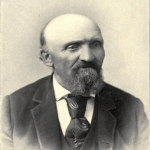
Few lives have been more active or more thoroughly filled with incidents of interest and of unusual nature than has that of John Krall, one of the pioneers of Idaho, and for about thirty-five years a resident in the vicinity of Boise City. Now a wealthy man, he is indebted to himself alone for his fortune, for he started out in youth to fight the battle of life, a poor boy, and by the exercise of industry and perseverance, in the face of great difficulties, he came off victor over all.
Mr. Krall is a native of Germany, born December 10, 1835, his parents and ancestors likewise being of German birth. His father owned a flouring mill and the lad early learned the business. When he had mastered the branches of learning taught in the government schools he went to England, and there, at sixteen, took up the study of the English language and customs, while he worked as a baker and confectioner. Desiring to see something of the world, and well equipped to earn a living, as he was familiar with two languages and had mastered two trades, he shipped aboard a vessel and in the next few years sailed to various parts of the world. Once, when sailing around Cape Horn, he was shipwrecked, and the disabled vessel was towed to Valparaiso by an English man-of-war. From that city Mr. Krall went to Honolulu, and thence to San Francisco, where he remained until 1856. He then went to Oregon and Washington, and rented a mill at Dallas, Oregon, and also carried on business near Salem until 1859. The following two years he passed at Vancouver, in Washington.
In 1861 Mr. Krall came to Idaho, and for some time he was more or less interested in mining at various places. He took out seven thousand dollars’ worth of precious minerals in six weeks at Florence, and supposing that he had nearly exhausted the resources of the claim he sold it for a thousand dollars, but subsequently seventy-five thousand dollars or more were made from this property. During the winter of 1861-2 Mr. Krall lived in Lewiston, and in the spring opened a bakery. He sold bread at fifty cents a loaf, as flour and other materials were extremely high-priced. In the autumn of 1862 he located in Placerville, Idaho. In 1864 he sold out and opened a bakery in Boise City, continuing in this enterprise until his store was destroyed by fire, in 1870, his loss at that time amounting to about twenty thousand dollars. The year after that unfortunate occurrence Mr. Krall bought four hundred acres of land from the United States government and planted eighty acres with different kinds of fruit trees. He has made a specialty of raising fruit and has been exceptionally successful. His farm extended to the original limits of Boise City, and when the town developed Mr. Krall platted a portion of his orchard and sold the lots to citizens. As he made a point that no buildings should be erected save good and substantial ones, the result is that this section of the city is one of the most beautiful and desirable as a place of residence in Boise. Still actively concerned in fruit-growing and other business enterprises, Mr. Krall is as industrious and busy now as he has been in the past. Until of late he has been connected with the Democratic Party, but is now independent. Socially he is a member of the Ancient Order of United Workmen.
In 1865 Mr. Krall married Miss Barbara Queen, who died in 1883, and left two children. The daughter is the wife of W. Scott Neal, a well known business man of this city, and the son, John, Jr., is also a citizen of this place. In 1885 Mr. Krall, Sr., married Miss Eva Ayers, daughter of Peter and Mary (Dausch) Ayers. The former was born in Wisconsin and the latter in New York State, and both are now deceased. Mrs. Krall was born in Denver, Colorado, June 20, 1859. She is a member of the Methodist church. The three sons born of this union are named respectively Frank E., Albert R. and Louis V. The family is one of prominence in the community, the members of the household occupying a high position in social circles. In business and social life Mr. Krall commands the respect of all, for his reputation is above question, his word being as good as any bond that was ever solemnized by signature or seal. His labors in the development of the natural resources of the state have been of great benefit to the city, and his public-spirited interest in all measures pertaining to the general good has been a potent factor in promoting educational, moral and material welfare.
